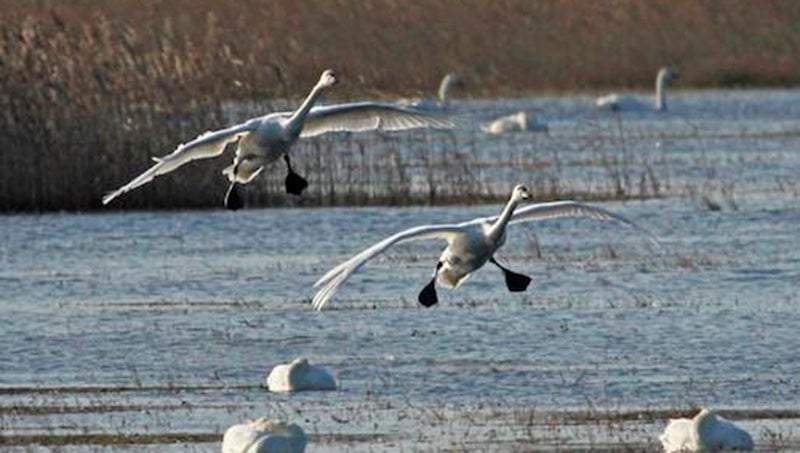Service invites public input on draft water management plan for Pocosin Lakes National Wildlife Refuge
Published 11:04 pm Friday, June 26, 2020

- (Jeff Lewis)
|
Getting your Trinity Audio player ready...
|
The U.S. Fish and Wildlife Service is inviting the public to comment on the draft water management plan and associated environmental assessment (Draft WMP/EA) for Pocosin Lakes National Wildlife Refuge. The comprehensive plan describes how water management may occur on the refuge over the next 15 years to achieve strategical goals and objectives in the refuge’s Comprehensive Conservation Plan.
The Draft WMP/EA is based on the best available science and prioritizes adaptive management based on site-specific data collection. It describes the water management infrastructure on the refuge, systems function and limitations, and how the systems will be managed to meet refuge goals and objectives. The Draft WMP/EA is available for viewing or download at www.fws.gov/refuge/pocosin_lakes/
“The draft plan charts a clear course for the refuge’s future use of water resources while also protecting the Service’s investment in restoring over 37,000 acres of unique pocosin wetlands,” said Leo Miranda, the Service’s Regional Director for the South Atlantic-Gulf and Mississippi Basin Interior Regions. “The plan proposes creative, complementary strategies that allow the refuge to adapt to a changing Albemarle-Pamlico landscape. These strategies rely on close coordination with our state and local partners and will benefit our trust resources as well as our neighboring landowners.”
Since the 110,000-acre refuge’s establishment in 1990, the Service has implemented several restoration projects to counteract the impacts of an extensive ditch system that once drained and artificially dried out the peat soil, degrading habitat and making the areas more susceptible to catastrophic wildfire. A resilient system of infrastructure is now in place to retain and conserve rainwater as well as restoring more natural conditions to the pocosin wetlands.
Pocosin (a Native American term meaning “swamp on a hill”) wetlands occur on peat domes and are at slightly higher elevations than the surrounding lands. The restoration allows for seasonal water level fluctuations to moisten the peat soil and release soaked up rainfall slowly. Under these conditions, pocosin wetlands provide high quality habitat for waterfowl and other wildlife, protect against catastrophic fire, ease the impacts of storm flows, and repel the increasing threat of saltwater intrusion in northeastern North Carolina.
“From marsh rabbits to black bears, many of North Carolina’s native species depend on the vast habitat that functioning pocosins provide. Restoring the ecological function of any habitat on such a large landscape is a very complex undertaking, as you must account for impacts to surrounding lands,” said Gordon Myers, the executive director for the North Carolina Wildlife Resources Commission. “We are extremely pleased that the Service is gathering public input on the water management plan for Pocosin Lakes National Wildlife Refuge and look forward to working together through the planning process.”
With a majority of the restoration efforts complete, the Service is now focusing on science-driven adaptive management that will reconnect a healthy pocosin landscape and continue to provide high quality habitat for wintering waterfowl as well as many other migratory birds and wildlife species. The WMP/EA proposes to enhance and maintain water management across habitats on refuge. In addition to 37,000 acres of restored pocosin wetlands, the Service manages over 8,000 acres for waterfowl habitat and protects over 58,000 acres of peatlands that were not altered or only minimally altered prior to refuge establishment.
The Service will hold two virtual informational sessions where the public will have an opportunity to learn more about the draft WMP/EA and ask questions. The hour-long sessions will be held on Thursday, July 9, 2020, at 1 p.m. ET and Tuesday, July 14, 2020, at 7 p.m. ET. Information on how to participate in the informational sessions is available at: www.fws.gov/refuge/pocosin_lakes/
Comments to inform the draft WMP/EA will be accepted until July 31, 2020. Written comments may be submitted by email or mail:
Email: pocosinlakes@fws.gov
Mail: Pocosin Lakes National Wildlife Refuge, PO Box 329, Columbia, NC 27925
The Service is committed to providing access to the information meeting for all participants. Please direct all requests for sign language interpreting services, close-captioning or other accommodation needs to Kristen Peters, kristen_peters@fws.gov or 404-679-7172, or TTY 800-877-8339 by close of business July 1, 2020.
For more information about the refuge and its wetland restoration efforts, visit the Pocosin Lakes National Wildlife Refuge webpage at www.fws.gov/refuge/pocosin_lakes/.
The mission of the U.S. Fish and Wildlife Service is working with others to conserve, protect, and enhance fish, wildlife, plants, and their habitats for the continuing benefit of the American people. For more information on our work and the people who can make it happen, visit fws.gov. Connect with the Service on Facebook, follow our tweets, watch the YouTube Channel and download photos from Flickr.

